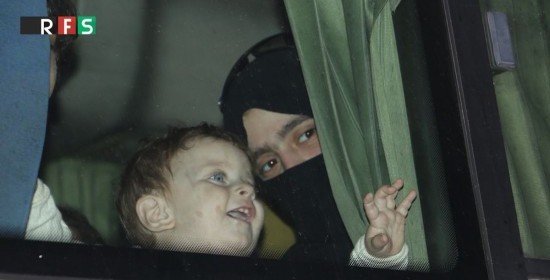PHOTO: Mother and child arrive in northwest Syria, following evacuation from besieged Damascus suburb of Darayya, August 27, 2016
Christina Okello reports for France’s RFI, with a contribution from EA:
Hundreds of Syrians living in a besieged rebel town near Damascus were moved on Friday to government-controlled areas. It’s part of a new deal between the government and rebels whereby the latter cedes control to Assad forces in return for the safe passage of civilians and fighters out of besieged cities. The evacuation however has been slammed by the UN.
Hundreds of families were evacuated from the Damascus suburb of Darayya last week and bused out of nearby Moadamiya on Friday, as part of a new truce to end a four-year government siege.
The opposition has criticised the deal, arguing it is an attempt by the government to clear out rebel-held areas and regain control.
And the UN’s Syria envoy Staffan de Mistura and critics have voiced similar concern.
“The deal is linked to Assad’s current difficulties in the North West of Syria,” Scott Lucas, a professor at Birmingham University, and Editor of the website EA World View, told RFI on Friday.
The timing of the evacuation is significant because it comes during a renewed offensive by rebel groups against Assad forces in Aleppo and Hama.
“The regime just doesn’t have the manpower within the Syrian military and within the militias to be able to hold territory,” argues Lucas.
Since the start of their coordinated assault on Tuesday, the rebel alliance — made up of elements of the Free Syrian Army and the Salafist group Jund Al-Aqsa — has recaptured 14 villages, mainly in the north of Hama province.
But Assad has tried to fight back by launching a counteroffensive in Aleppo, effectively scuppering the UN’s hopes for a temporary ceasefire.
“They’re putting wave after wave of attacks to try to do this, and they’re trying to hold up like this one victory, but the problem is they’ve got to do this on multiple fronts. They not only have to secure areas on the Aleppo front, they also have to secure areas on the Hama front,” warns Lucas.
Starve and Surrender
While the fighting rages on, President Bashar al-Assad continues to discuss several evacuation deals with rebel forces.
The severity of the government’s lengthy sieges gives it the upper hand, for now. Some rebels have admitted they were forced into agreeing to give up the town of Darayya because of deteriorating humanitarian conditions.
“The regime is in a position of strength,” Claudia Bianco, an analyst at the Euro Gulf Information centre, told RFI.
“It can allow people to evacuate, but at the same time show to the world that it is actually making some concessions, because the public outcry against the siege in areas like Daraya has been so strong.”
There are at least 18 areas in Syria that are under siege, mostly by government forces, and Daraya, which has captured the public’s attention, is no exception.
“It’s a political strategy, it’s trying to change its image,” reckons Bianco.
Yet, this hasn’t stifled criticism of the Assad side, that it’s employing “starve or surrender” tactics.
A Looming Partition?
For Scott Lucas, the evacuation strategy has wider implications: “We’re looking at a de facto partition in the country. You’re going to have Kurdish areas of Syria up in the north-east because Kurds have pushed back the Islamic State.” This follows a Turkish-led offensive in Jarablus last week to push out the Islamic State armed group.
“The rebels who now have Turkish support will hold part of the north and the northwest,” continues Lucas, “and the Assad regime which can no longer hold, will try to hold a line from the Mediterranean through Homs to Damascus.”
The weakness of the Assad forces was exposed back in 2015 when rebels took the entire province of Idlib up in the north west.
That’s when the Russians came in with air strikes.
Russia though on Friday announced it was contemplating a cooperation deal with the United States on Syria, “soon”, according to president Vladimir Putin, raising the prospect that it may distance itself from its ally, Syria.
“President Assad will hope to continue to remain in power as president if not of all of Syria, at least as part of it,” Lucas says.

